Unit 3 Computers单元课件
文档属性
| 名称 | Unit 3 Computers单元课件 | 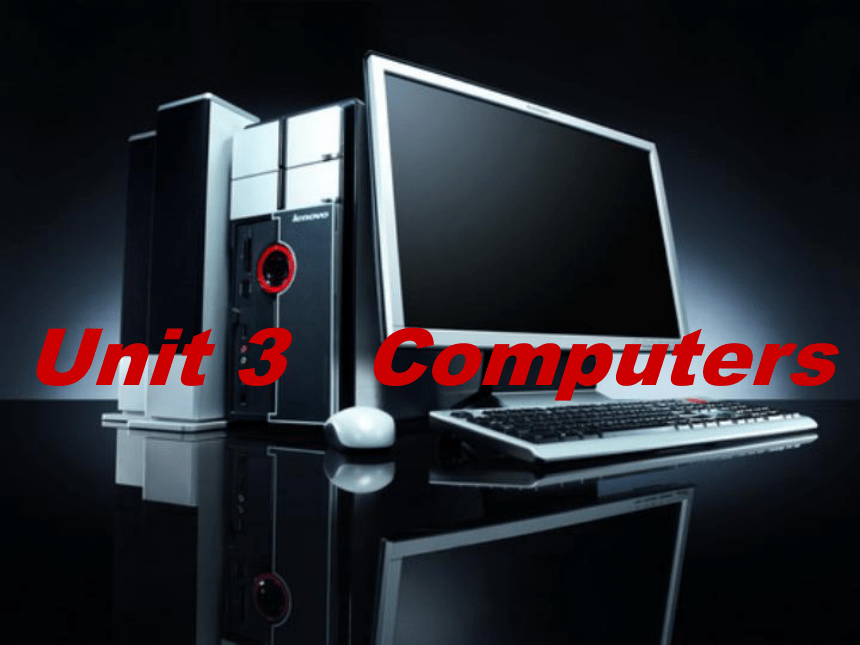 | |
| 格式 | zip | ||
| 文件大小 | 7.1MB | ||
| 资源类型 | 教案 | ||
| 版本资源 | 人教版(新课程标准) | ||
| 科目 | 英语 | ||
| 更新时间 | 2012-09-17 22:09:34 | ||
图片预览

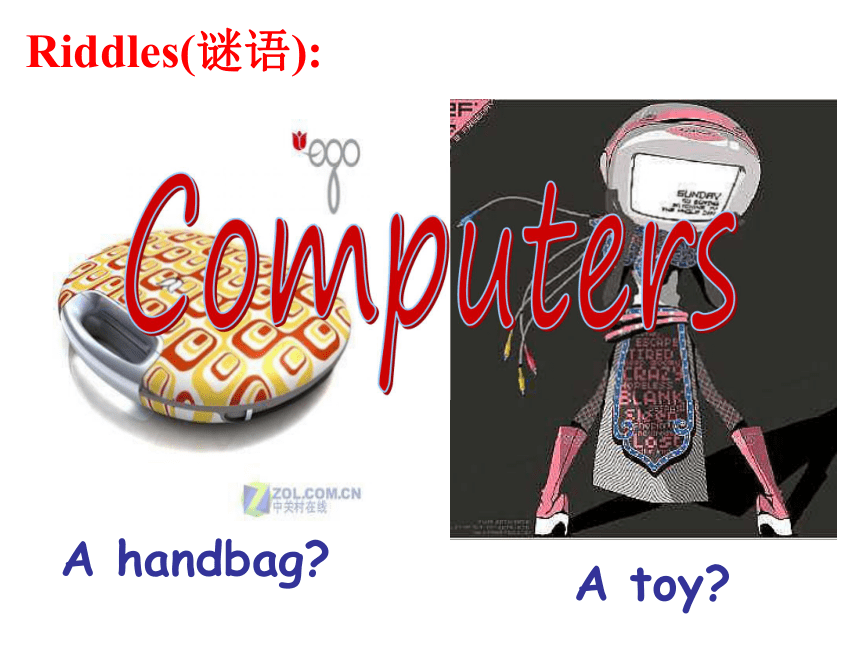
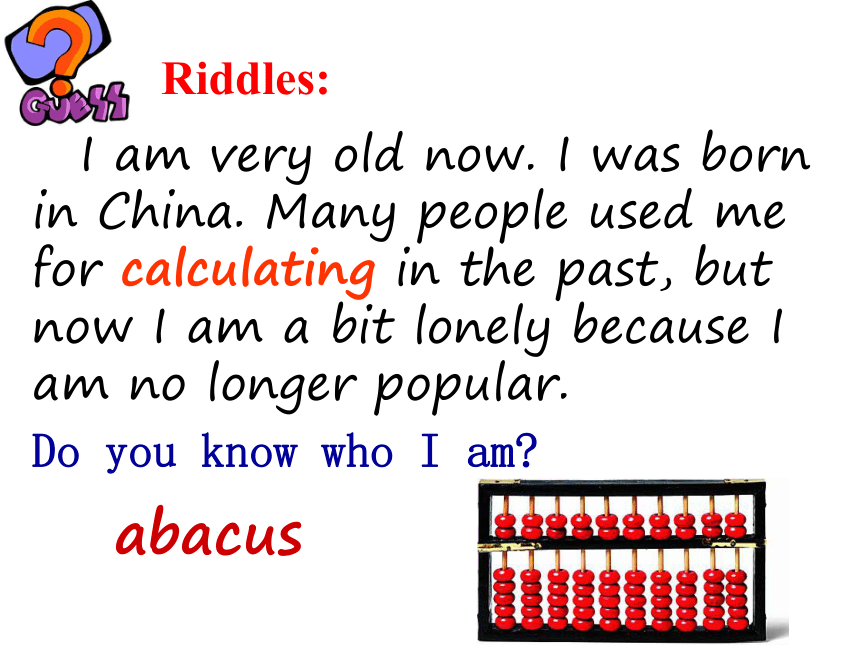
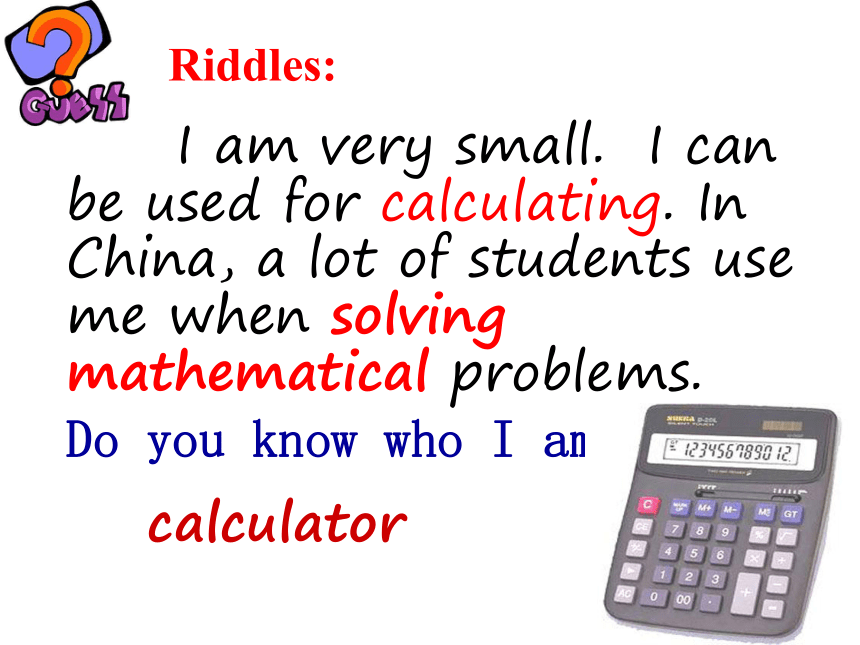
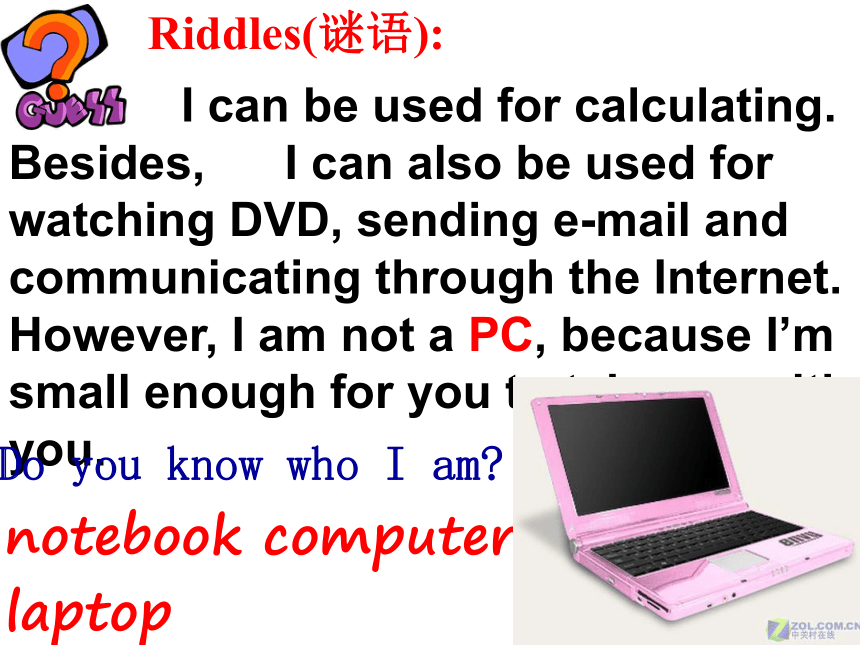
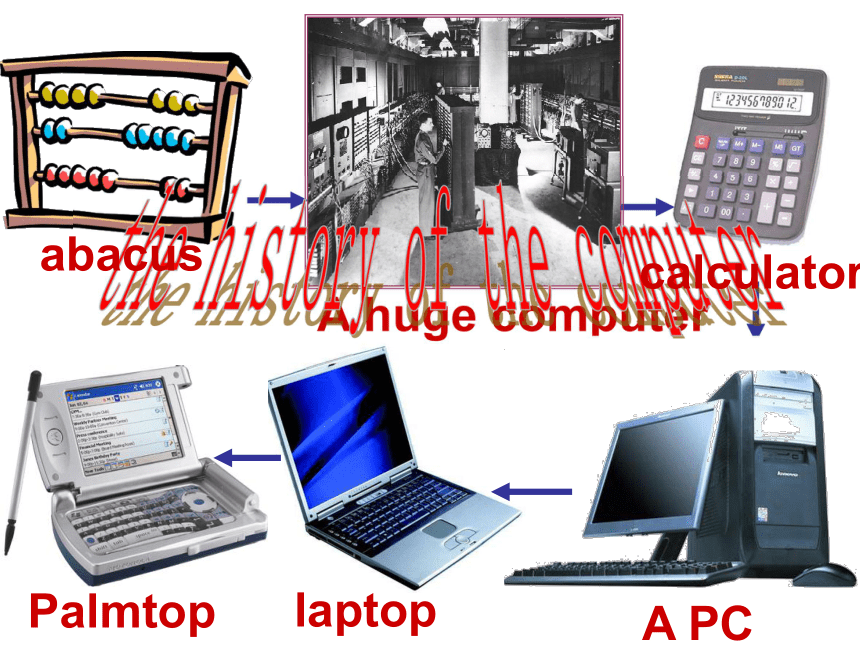
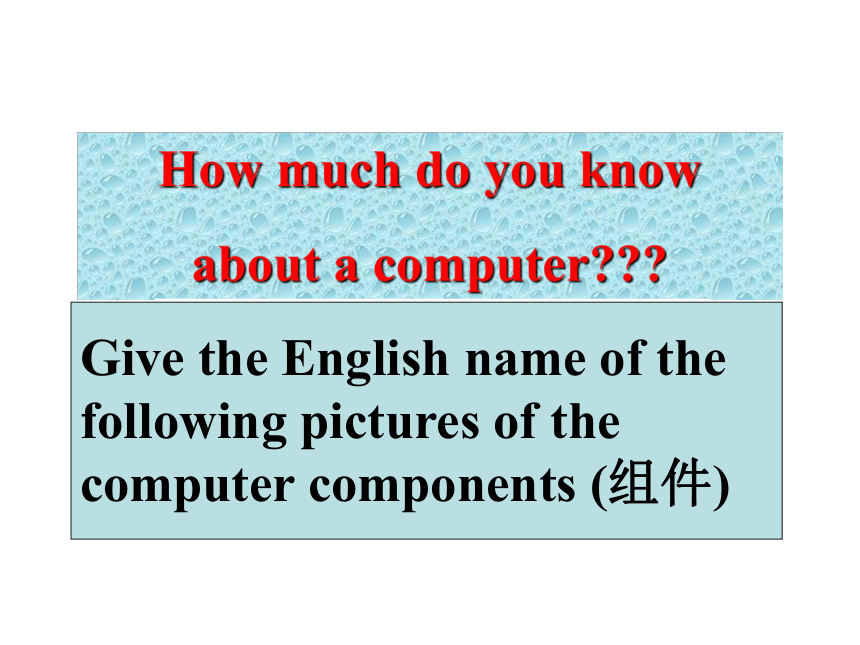
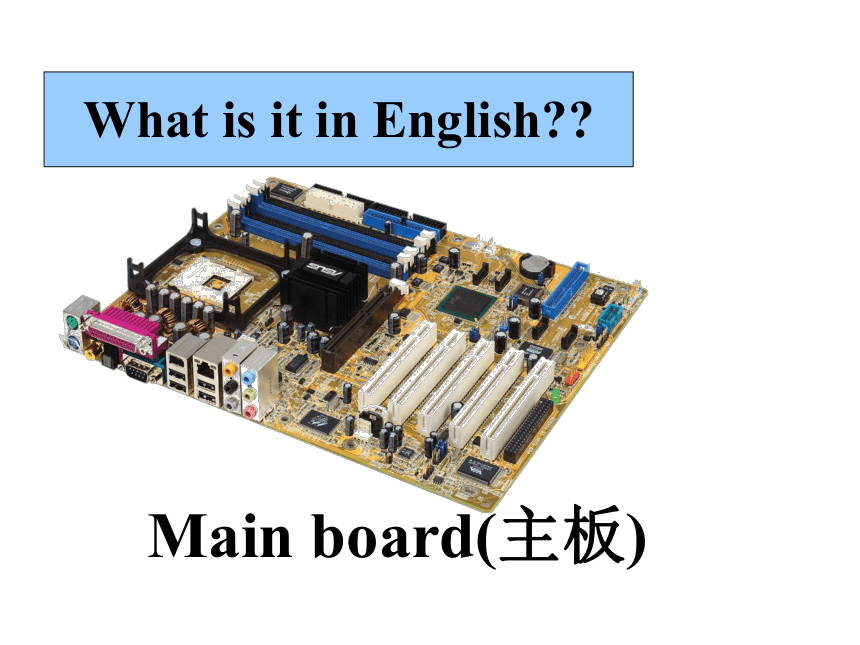
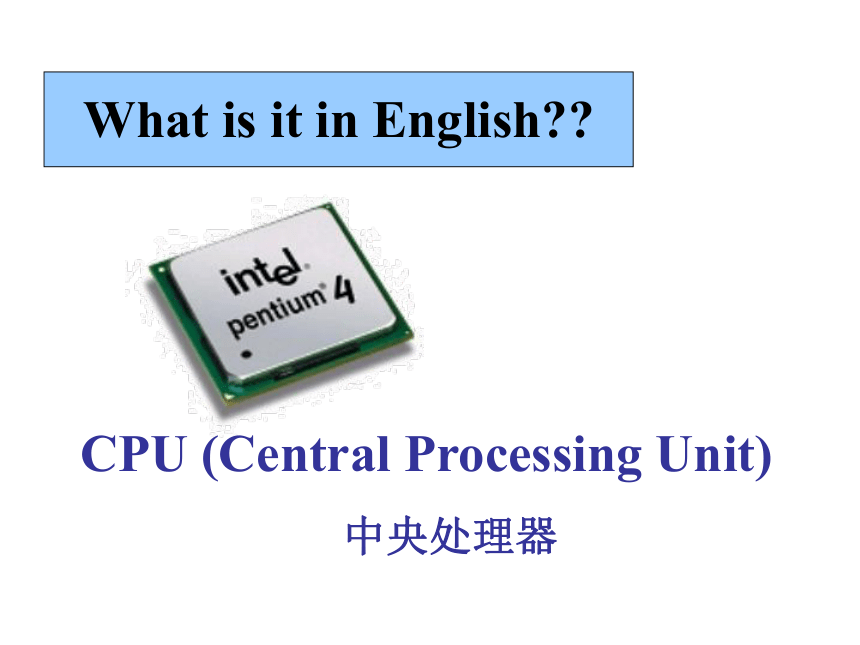
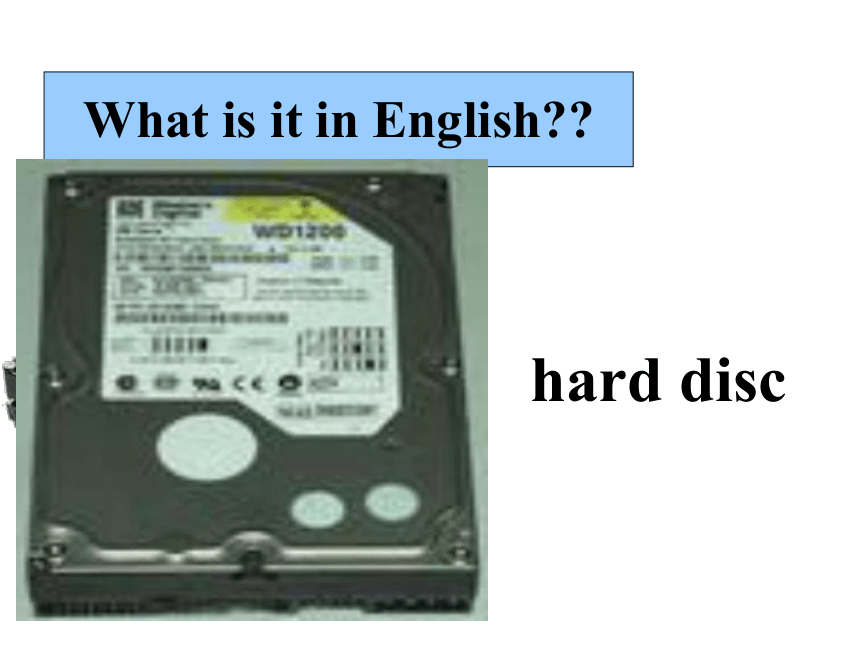
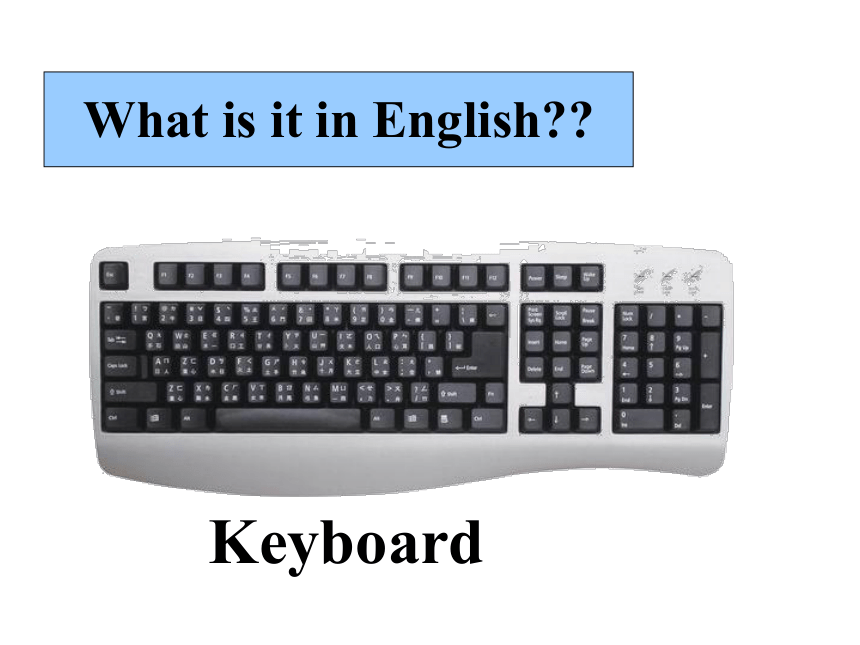
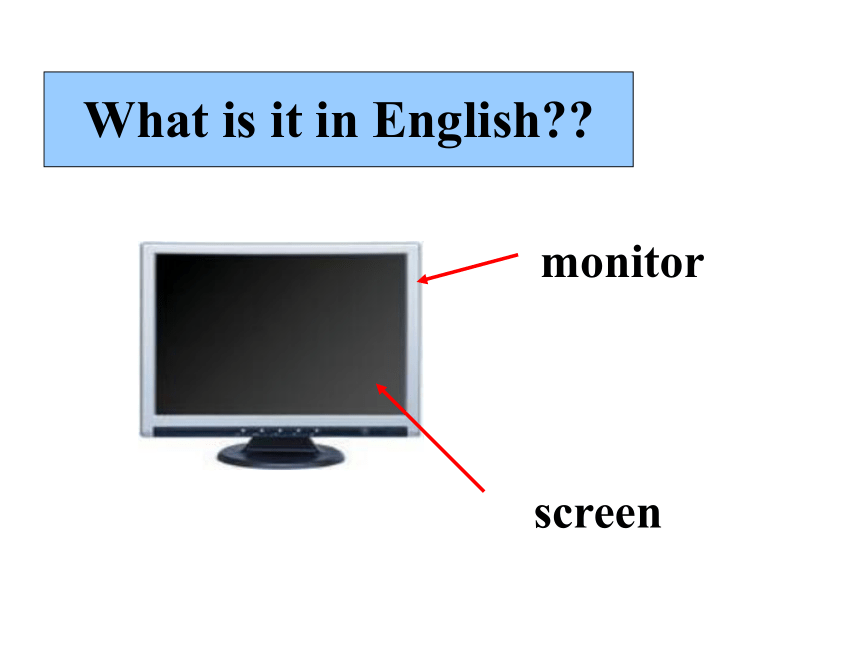
文档简介
(共171张PPT)
Unit 3 Computers
A toy
A handbag
Riddles(谜语):
I am very old now. I was born in China. Many people used me for calculating in the past, but now I am a bit lonely because I am no longer popular.
Do you know who I am
abacus
Riddles:
I am very small. I can be used for calculating. In China, a lot of students use me when solving mathematical problems.
Do you know who I am
calculator
Riddles:
I can be used for calculating. Besides, I can also be used for watching DVD, sending e-mail and communicating through the Internet. However, I am not a PC, because I’m small enough for you to take me with you.
notebook computer/
laptop
Do you know who I am
Riddles(谜语):
A huge computer
A PC
calculator
abacus
Palmtop
laptop
How much do you know
about a computer
Give the English name of the
following pictures of the
computer components (组件)
What is it in English
Main board(主板)
What is it in English
CPU (Central Processing Unit)
中央处理器
What is it in English
hard disc
What is it in English
Keyboard
What is it in English
monitor
screen
What is it in English
mouse
DVD ROM
What is it in English
monitor
screen
mouse
keyboard
hard disk
DVD-ROM
(1) the part of the computer that looks like a television.
(2) the part of the monitor that you look at.
(3) something you use to click on things (files, etc.)
(4) the part of the computer that you type on.
(5) the part of a computer that stores information.
(6) The part of computer that we can put a CD in.
Work out the names
Some words on the Internet:
netizen 网民
Net surf 网络漫游
virus 病毒
cyber 计算机的,网络的
browse 浏览
cyberspace 网络空间
scroll 滚动显屏
access charge 接入费
cursor 光标
download 下载
hacker 黑客
chat room 聊天室
click 点击
website 站点
Do you know in what ways computers
are used today
Work out a list and compare it with
your partner.
Computer and Internet
send e-mails
draw pictures
play games
communicate with my friends.
search for information
listen to music
watch movies
……
exchange ideas
What are the advantages and disadvantages of the computers
I think that …
In my opinion …
I believe that …
What’s your reason
Why do you think so
Discussion
1. Surf the web for news or information at home and abroad
2. Play games to relax or for fun
3. Communicate with others, like sending emails, chatting online, leaving messages etc.
4. Download music, films or other files
5. go shopping on line
6. Use QQ or cyberspace to make friends
7. Share experiences or feelings with others.
… …
Disadvantages
1. Some students may get too addicted to it.
2. Some students waste too much time in playing computer games.
3. Some spend too much time in chatting with others and may be cheated by someone online.
4. As a result, they have little time to study .
5. Besides, it is bad for our eyes and health to spend long time in front of computers.
Computers have great power.
They make our lives more colorful and more convenient.
BUT
Don’t forget that computers are modern tools
which can’t take the place of real people.
Never ignore the people beside you or even far away.
Conclusion
There is no doubt that computer has two sides ,too. If we make good use of it, it will make our lives more colorful and convenient. But don’t lose yourself in playing computers. Just remember: Keep fit, study hard and live your dream.
As we know, with the development of society, computers are playing more and more important roles in our daily life. They can almost be used in every field. It is more convenient for us to communicate with others, so it is a good way to make more friends. And It is also easier for us to search for the information we want, which benefits our study, work and life.
sample writing
However, as the old saying goes: Each coin
has two sides. It has disadvantages as well.
Some students spend too much time using it.
As a result, they have little time to study.
In a word, if we make good use of it, it will
make our lives more colorful and convenient.
But don’t lose ourselves in playing
computers. Just remember: Keep fit, study
hard and realize your dream.
Today we have learnt :
1. some useful words and expressions about computer
2. name each part of a computer
3. advantages and disadvantages of the computers.
Summary
1. Write a passage about the advantages and disadvantages of computers
2. Prepare for the next period.
Unit 3
computers
keyboard
mouse
monitor
screen
speaker
host computer
Reading:
Who am I
Skimming page 18
1. Who am I
A computer.
2. What's the general idea of this passage
The history and development of computers as well as their applications.
difficult phrases
calculating machine
Analytical machine
card with holes
technological revolution
universal machine
artificial intelligence
计算器
分析机
穿孔卡
技术革命
万能机,通用机器
人工智能
Calculating machine
Computer
Internet
Analytical machine
Artificial intelligence
Universal machine
The order of the appearance
①
②
③
④
⑥
⑤
The development of computers:
Calculating machine
Analytical machine
Universal machine
Artificial intelligence
Computer
Internet
Careful reading:
English weekly,
issue 11, Task Ⅱ
summary
Today we have learnt the history and development of computers.
2. Meanwhile you also know how widely computers are used in our lives.
Homework
1. Read the passage as fluently as you can.
2.Underline the useful expressions
Unit 2 Computers
Reading
I, the _________, was a calculating machine in 1642 in _______.In 1936, I became a “_________ machine” to _____any mathematical problem. Since the 1970s I have been used first as a ___ and then as a _______in office and ______. Many changes have happened to my ____, so my _______ totally changed.
I have been widely used in many fields, I have also been put into robots to _______the Moon and Mars.
computer
France
universal
solve
PC
laptop
homes
size
shape
explore
Intensive reading:
Underline the phrases &sentences that you think are important
1.随着时间流逝
over time/ as time goes by
simplify difficult sums
produce an answer quicker than any person
be considered a technological revolution
the start of artificial intelligence
solve any difficult
from then on
4.被认为是一个技术革命
5. 人工智能的开始
6.解决任何数学难题
7.从那时起
3.与任何人更快地算出答案
2.简化复杂算术题
mathematical problem
8. 到二十世纪四十年代
9.长得大如屋子
10.因此
11.如此…以至于
12.独自站立
13.在二十世纪六十年代初
14.与他人分享知识
15.也,及
by the 1940s
grow as large as a room
as a result
in the early 1960s
share knowledge with others
as well as
stand by oneself
so…that
16.探测月球和火星
17.给人类提供高质量的生活
18.充满幸福
19.一个忠实的朋友
20.与…有共同点
21.电脑的发展
22.与…比较
provide humans with a life of high quality
be filled with happiness
have something in common with
development of computers
explore the Moon and Mars
a devoted friend
compare… with
in common: for or by all of a group 共同的;共有的;共用的
The land is owned in common by the
villagers. 村民共有土地
in common 常常同have连用,如:
have nothing in common 无共同之处
have little in common 几乎无共同之处
Language points
have something in common 有一些共同之处
have a lot in common 有许多共同之处
You know, Dorothy, you and I have one thing in common.
2) We just had nothing in common and I couldn’t communicate with his dull business friends.
3) I suddenly felt we had a lot in common.
2. calculate v. work (sth.) out by using numbers
e.g.: calculate the cost of sth.
calculator n.
让我们一起回忆一下以or结尾的词吧:
visitor, survivor, competitor, creator, sailor, actor, editor …
3. analytical adj.分析的, 解析的
analyse vt. 分析;研究
analysis n. 分析;研究
analyst n. 分析家
analytic adj. 分析的;分解的
4. artificial adj. 人工的, 人造的
artificial flowers/limbs/pearls
假花/假肢/假珍珠
artificial intelligence
人工智能
5. as a result 结果;终于;因此
My friend Martin was very sick with a strange fever; ______, he could neither eat nor sleep.
A. as a result B. after all
C. anyway D. otherwise
6. totally adv. 整个地; 完全地
totally blind 全盲
total adj. 完全的; 整个的
total silence 寂静无声
in total 总共
7. Over time my memory has developed so much that, ... I never forget anything I have been told.
so ... that ... that引导结果或目的状语从句。
The weather was ______ cold that I didn’t like to leave my room.
A. really B. such
C. too D. so
8. But I was always so lonely standing there by myself, until in early 1960s they gave me a family connected by a network.
until表示“直到……时”,在肯定句中,指从开始到结束的整段时间,谓语动词一般是延续性的。在否定句中构成not ... until,意为“直到……才”,指到某一点动作才开始,谓语动词一般是非延续性的。
其强调句是it is (was) not until ... that ...。当not until位于句首时,句子要进行倒装。
1.The experts explored the island until the end of last year.
直到去年年底,专家们一直都在勘查这个小岛。
2.We didn’t solve the problem until Mr. Smith helped us.
直到史密斯先生帮助我们,我们才解决了那个问题。
It was not until last year that my hope became a reality.
Not until noon did it stop raining.
9. I have also been put into robots and used to make mobile phones as well as help with medical operations.
1) help (sb.) with sth. 协助(某人)做某事
A man is helping the police with their enquiries.
有一男子在协助警方进行调查。
2) as well as 也,还,而且
1. He grows flowers as well as vegetables.
2. She is a talented musician as well as being a photographer.
3) 这个句子是现在完成时被动语态,其结
构是 (have / has + been + 过去分词)
The radio has been repaired when
we phoned the shop.
1.Professor James will give us a lecture on the Western culture, but when and where ______ yet.
A. hasn’t been decided B. haven’t decided
C. isn’t being decided D. aren’t decided
2. When you get the paper back, pay special attention to what _______.
A. have marked B. have been marked
C. had marked D. had been marked
10. explore vt. & vi. 探索;探测;探究
1) The experts are exploring every part of the island.
专家们正在勘查这个岛的各个部分。
2) He couldn’t wait to set out and explore.
他等不及要动身去探险。
3) Can you explore the market possibility for us
您能为我们考察一下市场前景吗?
11. anyhow 无论如何;即使如此
1)Anyhow, you can try.
无论如何你可以试试。
2)I couldn’t think of the name of that man anyhow.
我怎么也想不出那人的名字来了。
3) I don’t care what you say; I’m going to do it anyhow.
我不管你说什么;不管怎样我要去做。
12. goal n. 目标;目的;球门
They achieved their goal of increasing sales by five percent.
achieve/reach a goal
set (yourself/somebody) a goal
long-term goal/short-term goal
I scored the first /winning goal.
His ultimate goal was to set up his own business.
The Present Perfect Passive Voice
Grammar
现在完成时的被动语态表示动作发生在过去, 到现在已经完成或对现在仍有影响。
现在完成时的被动语态
The structure of the present perfect passive voice is:
have / has + been+~ed
主动语态即主语为动作的执行者;被
动语态即主语为动作的承受者。现在完
成时的被动语态同它的主动语态一样,
强调过去的动作对现在造成的影响或结
果,但主语为动作的承受者,表示“……
已经被……”。
The new school has been set up.
新学校已经建成了。
Can you find out the sentences in the reading passage on page 18
1.Over time I have been changed quite a lot.
2….I have been used in offices and homes since the 1970s.
3. Over time my memory has developed so much that, like an elephant, I never forget anything I have been told.
4. Since the 1970s many new applications have been found for me.
2. 现在完成时被动语态的肯定式为:
have / has + been + done
The experiment has been done successfully.
这个实验做得很成功。
现在完成时被动语态的否定式为:
have / has + not + been + done
Tom’s novel has not been published.
汤姆的小说还没有被出版。
现在完成时被动语态的一般疑问句需将have / has提到主语的前面。
Has his bike been repaired
他的自行车修好了吗?
现在完成时被动语态的特殊疑问句为:疑问词 + have / has + been + done
Who has been invited
谁受到了邀请?
现在完成时的被动语态表达以下两个
概念:
1. 说话时已经完成的动作或出现的结果。
2. 主语是行为动作的承受者。
现在完成时的被动语态由have/has been
+v-ed构成,其中v-ed为过去分词,
表示被动。
I have been told about it many times.
The bridge has just been built.
在使用现在完成时的被动语态时要
注意以下两点:
1. 过去分词前有两个助动词:
have / has和been。
2. 必须表示被动。
注意:
副词的位置
often, usually, always, never, hardly, seldom等副词置于have / has和been中间。如:
[误] Such a man has been hardly
believed.
[正] Such a man has hardly been
believed.
2. 并不是所有动词都有被动语态
happen, take place, break out, belong
to, cost, last等不及物动词或词组无被
动语态。如:
[误] Great changes have been taken
place in China since 1978.
[正] Great changes have taken place in China since 1978.
3. 短语动词不可分割,也不能省略其中的介词或副词。如:
1)The patients have been taken good care of.
2)The amber room has been taken apart and put into several large wooden boxes.
3)This matter has been properly dealt with and you needn’t worry about it.
4. 一些特殊动词, 如borrow, finish, buy, start, return, marry, open, join等表示短暂动作的词构成的现在完成时的被动语态不能与表示一段时间的状语连用。若要表达相应的意思, 则需改换动词或时态。如:
My brother has had (不能用has bought) this bike for almost four years.
How long has this book been bought
How long ago was this book bought
(1) 把主动语态的宾语变为被动语态的主语。
(2) 把谓语变成被动结构 (be+过去分词)
(根据被动语态句子里的主语的人称和数,以及原来主动语态句子中动词的时态来决定be的形式)。
主动语态变被动语态的方法
(3) 把主动语态中的主语放在介词by之后作宾语, 将主格改为宾格。
All the people laughed at him.
He was laughed at by all the people.
They make the bikes in the factory.
The bikes are made by them in the
factory.
(4) 双宾语动词变被动语态可将其中的一个宾语变为主语, 另一个保留不动。
主动:I have given him the key.
被动:He has been given the key.
被动:The key has been given (to) him.
(5) 带复合宾语的动词变被动语态时, 只能将宾语变为主语, 原来的宾补保留不动, 改称主语补足语。
主动:I have asked her to help you.
被动:She has been asked to help you.
Turn the following into the Passive
Voice.
1. We have planted some trees around the lake.
2. My father has locked the door.
3. Someone has turned off the light.
Some trees have been planted
around the lake.
The light has been turned off.
The door has been locked.
4. They will hold the Olympic Games in London in the year 2012.
5. They have rebuilt the bridge.
The bridge has been rebuilt.
The Olympic Games will be held in
London in the year 2012.
Page 21,Ex 2
Page 57,Ex 1,
Homework
<世纪金榜>page 35-36(36页第三题语法填空不做);
page 57,Ex 2,做书上;
熟读课文,背诵最后一段或page 20 Ex 2.
Period 5
Listening &reading
Put the Chinese into English to complete the sentences.
1. You can see the house __________________ (未油漆) for years. (paint)
2. How many workers _________________(已派遣) to build the railway
3. — Why does Mary look so unhappy — She _____________________ (被嘲笑) by her classmates.
has not been painted
have been sent
has been laughed at
4.It is said that the house __________________ (闯进了) by two thieves.
5.The price of a color TV set ______________________ (降价了) again.
6.What __________________ (已被译成) into many foreign languages (translate)
7.Thousands of students ___________________ (被录取) the key universities in our school.
has been broken into
has been brought down
has been translated
have been admitted to
Listen to the whole text and write down the main idea in one sentence.
Two students are talking about
_______________________.
information technology
Listen to Part A and fill in the chart
below. Then do the same with Part B.
Part A
What does IT include
What is the most popular form of IT
Computers, books,
radio and TV
books
Part B
Which form of IT describes the skills of a sport best
Which form of IT
has the most functions
computers
TV
Listening text
Part A
D: Hi, Laura. It’s good to see you because I’m so bored . My homework is about Information Technology but I know everything there is to know about it.
L= Laura D= Dave
WHAT IS INFORMATION TECHNOLOGY
L: Come off it, Dave. I think I might know more than you.
D: OK. Let me test you! Here’s the first question. What’s information technology
L: Gosh, that’s easy! It’s computer, of
course.
D: Ah! That’s just where you’re wrong.
It includes books, radio and TV as well.
L: Really! Well, I never.
D: Question number 2. Which is the most
popular form of IT in the world
L: Well, that must be computers this time.
D: No, it’s books. Think of all those people in developing countries without
computers. Their only form of IT is books!
L: Oh dear! I’m not doing very well.
Part B
D: Here’s the third question. Which form of IT is the best for describing the skills of a sport
L: It must be the radio.
D: Actually, it’s not. The best descriptions are on the TV because you can not only hear the technical language, but also see how it happens.
L: Goodness! Wrong again!
D: Here’s the last question. Which form of IT has the most functions
L: This time I must be right. It’s the
computer, of course.
D: Yes. You can watch a film, replay a
match, communicate with friends
through the Internet, get information
and find out what’s going on in the world.
L: Oh dear! Three questions wrong out of
four. Perhaps I don’t know as much
about IT as I thought I did!
ANDY – THE ANDROID
Who is Andy
Andy is part of an android football team.
Andy is as big as a human. In fact, Andy
looks like one too.
Andy is a striker on the football team.
Andy can run very fast.
Andy’s computer chips help him to move and think like a human.
…
1 Read the passage carefully and fill in the file for Andy.
Name: ________ job: __________
Appearance:_____________________
Size: ____________________________
Character: _______________________
Ability:________________________________
Andy
looks like a human
as big as a human
competitive, co-operative
striker
can move and think like a human
2. Create your own android. Fill in the file, and compare with your partner.
Name: __________
Appearance:_____________________
Size: ____________________________
Character: _______________________
Ability:________________________________
1. signal vi. & vt. 发信号; 用语言/行动) 示意,表明; 标志,证明
1) Don't fire until I signal.
2) He signalled to the waiter for the bill.
3) She signalled (that) it was time to leave.
4) The scandal surely signals the end of his political career.
1)Don’t start yet—wait for me to give a signal.
2) Her speech yesterday was a clear signal that her views have changed.
3)Astronomers have been picking up faint signals that may be from a distant planet.
天文学家们一直在接收可能来自遥远行星的微弱讯号。
n. 信号;暗示, 预示;
(无线电或电视的)讯号,讯息,图像
2. goal
n. 球门;(进球)得分;目标;目的
1) You’d better set a goal before you start the drill.
练习开始前,你最好设定一个目标。
2) He has achieved his goal of increasing sales by five percent.
他已经实现了他增加销售额5%的目标。
3) That’s the twentieth goal he’s kicked this season.
这是他本赛季踢进的第二十个球。
3. type n. 类型
1)This is a new type of machine, with lots of meters on it.
这是一种新型的机器, 上面有许多仪表。
2)I don’t think she’s the artistic type.
我认为她不属艺术家那类的人。
vt. & vi. 打字
Will you please type this letter for me
你帮我打一下这封信好吗
4. in a way 在某种程度上
1) In a way, you’re right.
2) You should dress in a way that befits a woman of your position.
你的衣着应与你这种地位的妇女相称。
3) The work is well done in a way.
4) The scheme rebounded on her in a way she had not expected.
她未曾想到这计谋反倒使她自食其果。
in the way of 挡……的道;妨碍
on one’s way (to) 在(去……)的路上
on the way 即将来到
by the way 顺便提一下
in no way 决不
all the way 自始自终;完全地
in this way 用这种方法
way 常见短语
5. arise (arose, arisen) vi. 出现;发生;呈现;起来(表示觉醒)
1) An opportunity has arisen.
2) A new difficulty has arisen.
3) We keep them informed of any changes as they arise.
4) As we sped down the highway, the lights of the city arose before us.
5) The peasants arose against their masters.
6. with the help of 在……的帮助下
With the help of the teacher, I have
made rapid progress in my English
study.
在老师的帮助下, 我的英语进步很快。
7. electronic adj. 电子的
This dictionary is available in electronic version.
这部词典有电子版。
2) I like to read books on electronic music.
我喜欢读一些关于电子音乐的书。
3) The firm is Britain’s main producer of electronic equipment.
该公司为英国主要的电子设备制造厂家。
8. deal with 处理;安排;对付
I have a matter of importance to deal with.
我有要事要处理。
2) I think we should work out a strategy to deal with this situation.
我想我们应该制订出一项行动计划,用来对付这种情况。
9. watch over 看守; 监视
They were watched over by three policemen.
watch out (for) 当心; 注意
watch for sb./sth. 观察等待
keep a watch on 监视
under the close watch 在严密的监视下
Write a description of your android and what it can do. You may draw a picture of it if you wish. Use your notes and the sample passage on page 24 to help you.
Homework
Summing up what you have learned of unit 3, preparing for an exam.
<世纪金榜>37-39
Tablet
Portable hard disc
Unit 3 Computers
A toy
A handbag
Riddles(谜语):
I am very old now. I was born in China. Many people used me for calculating in the past, but now I am a bit lonely because I am no longer popular.
Do you know who I am
abacus
Riddles:
I am very small. I can be used for calculating. In China, a lot of students use me when solving mathematical problems.
Do you know who I am
calculator
Riddles:
I can be used for calculating. Besides, I can also be used for watching DVD, sending e-mail and communicating through the Internet. However, I am not a PC, because I’m small enough for you to take me with you.
notebook computer/
laptop
Do you know who I am
Riddles(谜语):
A huge computer
A PC
calculator
abacus
Palmtop
laptop
How much do you know
about a computer
Give the English name of the
following pictures of the
computer components (组件)
What is it in English
Main board(主板)
What is it in English
CPU (Central Processing Unit)
中央处理器
What is it in English
hard disc
What is it in English
Keyboard
What is it in English
monitor
screen
What is it in English
mouse
DVD ROM
What is it in English
monitor
screen
mouse
keyboard
hard disk
DVD-ROM
(1) the part of the computer that looks like a television.
(2) the part of the monitor that you look at.
(3) something you use to click on things (files, etc.)
(4) the part of the computer that you type on.
(5) the part of a computer that stores information.
(6) The part of computer that we can put a CD in.
Work out the names
Some words on the Internet:
netizen 网民
Net surf 网络漫游
virus 病毒
cyber 计算机的,网络的
browse 浏览
cyberspace 网络空间
scroll 滚动显屏
access charge 接入费
cursor 光标
download 下载
hacker 黑客
chat room 聊天室
click 点击
website 站点
Do you know in what ways computers
are used today
Work out a list and compare it with
your partner.
Computer and Internet
send e-mails
draw pictures
play games
communicate with my friends.
search for information
listen to music
watch movies
……
exchange ideas
What are the advantages and disadvantages of the computers
I think that …
In my opinion …
I believe that …
What’s your reason
Why do you think so
Discussion
1. Surf the web for news or information at home and abroad
2. Play games to relax or for fun
3. Communicate with others, like sending emails, chatting online, leaving messages etc.
4. Download music, films or other files
5. go shopping on line
6. Use QQ or cyberspace to make friends
7. Share experiences or feelings with others.
… …
Disadvantages
1. Some students may get too addicted to it.
2. Some students waste too much time in playing computer games.
3. Some spend too much time in chatting with others and may be cheated by someone online.
4. As a result, they have little time to study .
5. Besides, it is bad for our eyes and health to spend long time in front of computers.
Computers have great power.
They make our lives more colorful and more convenient.
BUT
Don’t forget that computers are modern tools
which can’t take the place of real people.
Never ignore the people beside you or even far away.
Conclusion
There is no doubt that computer has two sides ,too. If we make good use of it, it will make our lives more colorful and convenient. But don’t lose yourself in playing computers. Just remember: Keep fit, study hard and live your dream.
As we know, with the development of society, computers are playing more and more important roles in our daily life. They can almost be used in every field. It is more convenient for us to communicate with others, so it is a good way to make more friends. And It is also easier for us to search for the information we want, which benefits our study, work and life.
sample writing
However, as the old saying goes: Each coin
has two sides. It has disadvantages as well.
Some students spend too much time using it.
As a result, they have little time to study.
In a word, if we make good use of it, it will
make our lives more colorful and convenient.
But don’t lose ourselves in playing
computers. Just remember: Keep fit, study
hard and realize your dream.
Today we have learnt :
1. some useful words and expressions about computer
2. name each part of a computer
3. advantages and disadvantages of the computers.
Summary
1. Write a passage about the advantages and disadvantages of computers
2. Prepare for the next period.
Unit 3
computers
keyboard
mouse
monitor
screen
speaker
host computer
Reading:
Who am I
Skimming page 18
1. Who am I
A computer.
2. What's the general idea of this passage
The history and development of computers as well as their applications.
difficult phrases
calculating machine
Analytical machine
card with holes
technological revolution
universal machine
artificial intelligence
计算器
分析机
穿孔卡
技术革命
万能机,通用机器
人工智能
Calculating machine
Computer
Internet
Analytical machine
Artificial intelligence
Universal machine
The order of the appearance
①
②
③
④
⑥
⑤
The development of computers:
Calculating machine
Analytical machine
Universal machine
Artificial intelligence
Computer
Internet
Careful reading:
English weekly,
issue 11, Task Ⅱ
summary
Today we have learnt the history and development of computers.
2. Meanwhile you also know how widely computers are used in our lives.
Homework
1. Read the passage as fluently as you can.
2.Underline the useful expressions
Unit 2 Computers
Reading
I, the _________, was a calculating machine in 1642 in _______.In 1936, I became a “_________ machine” to _____any mathematical problem. Since the 1970s I have been used first as a ___ and then as a _______in office and ______. Many changes have happened to my ____, so my _______ totally changed.
I have been widely used in many fields, I have also been put into robots to _______the Moon and Mars.
computer
France
universal
solve
PC
laptop
homes
size
shape
explore
Intensive reading:
Underline the phrases &sentences that you think are important
1.随着时间流逝
over time/ as time goes by
simplify difficult sums
produce an answer quicker than any person
be considered a technological revolution
the start of artificial intelligence
solve any difficult
from then on
4.被认为是一个技术革命
5. 人工智能的开始
6.解决任何数学难题
7.从那时起
3.与任何人更快地算出答案
2.简化复杂算术题
mathematical problem
8. 到二十世纪四十年代
9.长得大如屋子
10.因此
11.如此…以至于
12.独自站立
13.在二十世纪六十年代初
14.与他人分享知识
15.也,及
by the 1940s
grow as large as a room
as a result
in the early 1960s
share knowledge with others
as well as
stand by oneself
so…that
16.探测月球和火星
17.给人类提供高质量的生活
18.充满幸福
19.一个忠实的朋友
20.与…有共同点
21.电脑的发展
22.与…比较
provide humans with a life of high quality
be filled with happiness
have something in common with
development of computers
explore the Moon and Mars
a devoted friend
compare… with
in common: for or by all of a group 共同的;共有的;共用的
The land is owned in common by the
villagers. 村民共有土地
in common 常常同have连用,如:
have nothing in common 无共同之处
have little in common 几乎无共同之处
Language points
have something in common 有一些共同之处
have a lot in common 有许多共同之处
You know, Dorothy, you and I have one thing in common.
2) We just had nothing in common and I couldn’t communicate with his dull business friends.
3) I suddenly felt we had a lot in common.
2. calculate v. work (sth.) out by using numbers
e.g.: calculate the cost of sth.
calculator n.
让我们一起回忆一下以or结尾的词吧:
visitor, survivor, competitor, creator, sailor, actor, editor …
3. analytical adj.分析的, 解析的
analyse vt. 分析;研究
analysis n. 分析;研究
analyst n. 分析家
analytic adj. 分析的;分解的
4. artificial adj. 人工的, 人造的
artificial flowers/limbs/pearls
假花/假肢/假珍珠
artificial intelligence
人工智能
5. as a result 结果;终于;因此
My friend Martin was very sick with a strange fever; ______, he could neither eat nor sleep.
A. as a result B. after all
C. anyway D. otherwise
6. totally adv. 整个地; 完全地
totally blind 全盲
total adj. 完全的; 整个的
total silence 寂静无声
in total 总共
7. Over time my memory has developed so much that, ... I never forget anything I have been told.
so ... that ... that引导结果或目的状语从句。
The weather was ______ cold that I didn’t like to leave my room.
A. really B. such
C. too D. so
8. But I was always so lonely standing there by myself, until in early 1960s they gave me a family connected by a network.
until表示“直到……时”,在肯定句中,指从开始到结束的整段时间,谓语动词一般是延续性的。在否定句中构成not ... until,意为“直到……才”,指到某一点动作才开始,谓语动词一般是非延续性的。
其强调句是it is (was) not until ... that ...。当not until位于句首时,句子要进行倒装。
1.The experts explored the island until the end of last year.
直到去年年底,专家们一直都在勘查这个小岛。
2.We didn’t solve the problem until Mr. Smith helped us.
直到史密斯先生帮助我们,我们才解决了那个问题。
It was not until last year that my hope became a reality.
Not until noon did it stop raining.
9. I have also been put into robots and used to make mobile phones as well as help with medical operations.
1) help (sb.) with sth. 协助(某人)做某事
A man is helping the police with their enquiries.
有一男子在协助警方进行调查。
2) as well as 也,还,而且
1. He grows flowers as well as vegetables.
2. She is a talented musician as well as being a photographer.
3) 这个句子是现在完成时被动语态,其结
构是 (have / has + been + 过去分词)
The radio has been repaired when
we phoned the shop.
1.Professor James will give us a lecture on the Western culture, but when and where ______ yet.
A. hasn’t been decided B. haven’t decided
C. isn’t being decided D. aren’t decided
2. When you get the paper back, pay special attention to what _______.
A. have marked B. have been marked
C. had marked D. had been marked
10. explore vt. & vi. 探索;探测;探究
1) The experts are exploring every part of the island.
专家们正在勘查这个岛的各个部分。
2) He couldn’t wait to set out and explore.
他等不及要动身去探险。
3) Can you explore the market possibility for us
您能为我们考察一下市场前景吗?
11. anyhow 无论如何;即使如此
1)Anyhow, you can try.
无论如何你可以试试。
2)I couldn’t think of the name of that man anyhow.
我怎么也想不出那人的名字来了。
3) I don’t care what you say; I’m going to do it anyhow.
我不管你说什么;不管怎样我要去做。
12. goal n. 目标;目的;球门
They achieved their goal of increasing sales by five percent.
achieve/reach a goal
set (yourself/somebody) a goal
long-term goal/short-term goal
I scored the first /winning goal.
His ultimate goal was to set up his own business.
The Present Perfect Passive Voice
Grammar
现在完成时的被动语态表示动作发生在过去, 到现在已经完成或对现在仍有影响。
现在完成时的被动语态
The structure of the present perfect passive voice is:
have / has + been+~ed
主动语态即主语为动作的执行者;被
动语态即主语为动作的承受者。现在完
成时的被动语态同它的主动语态一样,
强调过去的动作对现在造成的影响或结
果,但主语为动作的承受者,表示“……
已经被……”。
The new school has been set up.
新学校已经建成了。
Can you find out the sentences in the reading passage on page 18
1.Over time I have been changed quite a lot.
2….I have been used in offices and homes since the 1970s.
3. Over time my memory has developed so much that, like an elephant, I never forget anything I have been told.
4. Since the 1970s many new applications have been found for me.
2. 现在完成时被动语态的肯定式为:
have / has + been + done
The experiment has been done successfully.
这个实验做得很成功。
现在完成时被动语态的否定式为:
have / has + not + been + done
Tom’s novel has not been published.
汤姆的小说还没有被出版。
现在完成时被动语态的一般疑问句需将have / has提到主语的前面。
Has his bike been repaired
他的自行车修好了吗?
现在完成时被动语态的特殊疑问句为:疑问词 + have / has + been + done
Who has been invited
谁受到了邀请?
现在完成时的被动语态表达以下两个
概念:
1. 说话时已经完成的动作或出现的结果。
2. 主语是行为动作的承受者。
现在完成时的被动语态由have/has been
+v-ed构成,其中v-ed为过去分词,
表示被动。
I have been told about it many times.
The bridge has just been built.
在使用现在完成时的被动语态时要
注意以下两点:
1. 过去分词前有两个助动词:
have / has和been。
2. 必须表示被动。
注意:
副词的位置
often, usually, always, never, hardly, seldom等副词置于have / has和been中间。如:
[误] Such a man has been hardly
believed.
[正] Such a man has hardly been
believed.
2. 并不是所有动词都有被动语态
happen, take place, break out, belong
to, cost, last等不及物动词或词组无被
动语态。如:
[误] Great changes have been taken
place in China since 1978.
[正] Great changes have taken place in China since 1978.
3. 短语动词不可分割,也不能省略其中的介词或副词。如:
1)The patients have been taken good care of.
2)The amber room has been taken apart and put into several large wooden boxes.
3)This matter has been properly dealt with and you needn’t worry about it.
4. 一些特殊动词, 如borrow, finish, buy, start, return, marry, open, join等表示短暂动作的词构成的现在完成时的被动语态不能与表示一段时间的状语连用。若要表达相应的意思, 则需改换动词或时态。如:
My brother has had (不能用has bought) this bike for almost four years.
How long has this book been bought
How long ago was this book bought
(1) 把主动语态的宾语变为被动语态的主语。
(2) 把谓语变成被动结构 (be+过去分词)
(根据被动语态句子里的主语的人称和数,以及原来主动语态句子中动词的时态来决定be的形式)。
主动语态变被动语态的方法
(3) 把主动语态中的主语放在介词by之后作宾语, 将主格改为宾格。
All the people laughed at him.
He was laughed at by all the people.
They make the bikes in the factory.
The bikes are made by them in the
factory.
(4) 双宾语动词变被动语态可将其中的一个宾语变为主语, 另一个保留不动。
主动:I have given him the key.
被动:He has been given the key.
被动:The key has been given (to) him.
(5) 带复合宾语的动词变被动语态时, 只能将宾语变为主语, 原来的宾补保留不动, 改称主语补足语。
主动:I have asked her to help you.
被动:She has been asked to help you.
Turn the following into the Passive
Voice.
1. We have planted some trees around the lake.
2. My father has locked the door.
3. Someone has turned off the light.
Some trees have been planted
around the lake.
The light has been turned off.
The door has been locked.
4. They will hold the Olympic Games in London in the year 2012.
5. They have rebuilt the bridge.
The bridge has been rebuilt.
The Olympic Games will be held in
London in the year 2012.
Page 21,Ex 2
Page 57,Ex 1,
Homework
<世纪金榜>page 35-36(36页第三题语法填空不做);
page 57,Ex 2,做书上;
熟读课文,背诵最后一段或page 20 Ex 2.
Period 5
Listening &reading
Put the Chinese into English to complete the sentences.
1. You can see the house __________________ (未油漆) for years. (paint)
2. How many workers _________________(已派遣) to build the railway
3. — Why does Mary look so unhappy — She _____________________ (被嘲笑) by her classmates.
has not been painted
have been sent
has been laughed at
4.It is said that the house __________________ (闯进了) by two thieves.
5.The price of a color TV set ______________________ (降价了) again.
6.What __________________ (已被译成) into many foreign languages (translate)
7.Thousands of students ___________________ (被录取) the key universities in our school.
has been broken into
has been brought down
has been translated
have been admitted to
Listen to the whole text and write down the main idea in one sentence.
Two students are talking about
_______________________.
information technology
Listen to Part A and fill in the chart
below. Then do the same with Part B.
Part A
What does IT include
What is the most popular form of IT
Computers, books,
radio and TV
books
Part B
Which form of IT describes the skills of a sport best
Which form of IT
has the most functions
computers
TV
Listening text
Part A
D: Hi, Laura. It’s good to see you because I’m so bored . My homework is about Information Technology but I know everything there is to know about it.
L= Laura D= Dave
WHAT IS INFORMATION TECHNOLOGY
L: Come off it, Dave. I think I might know more than you.
D: OK. Let me test you! Here’s the first question. What’s information technology
L: Gosh, that’s easy! It’s computer, of
course.
D: Ah! That’s just where you’re wrong.
It includes books, radio and TV as well.
L: Really! Well, I never.
D: Question number 2. Which is the most
popular form of IT in the world
L: Well, that must be computers this time.
D: No, it’s books. Think of all those people in developing countries without
computers. Their only form of IT is books!
L: Oh dear! I’m not doing very well.
Part B
D: Here’s the third question. Which form of IT is the best for describing the skills of a sport
L: It must be the radio.
D: Actually, it’s not. The best descriptions are on the TV because you can not only hear the technical language, but also see how it happens.
L: Goodness! Wrong again!
D: Here’s the last question. Which form of IT has the most functions
L: This time I must be right. It’s the
computer, of course.
D: Yes. You can watch a film, replay a
match, communicate with friends
through the Internet, get information
and find out what’s going on in the world.
L: Oh dear! Three questions wrong out of
four. Perhaps I don’t know as much
about IT as I thought I did!
ANDY – THE ANDROID
Who is Andy
Andy is part of an android football team.
Andy is as big as a human. In fact, Andy
looks like one too.
Andy is a striker on the football team.
Andy can run very fast.
Andy’s computer chips help him to move and think like a human.
…
1 Read the passage carefully and fill in the file for Andy.
Name: ________ job: __________
Appearance:_____________________
Size: ____________________________
Character: _______________________
Ability:________________________________
Andy
looks like a human
as big as a human
competitive, co-operative
striker
can move and think like a human
2. Create your own android. Fill in the file, and compare with your partner.
Name: __________
Appearance:_____________________
Size: ____________________________
Character: _______________________
Ability:________________________________
1. signal vi. & vt. 发信号; 用语言/行动) 示意,表明; 标志,证明
1) Don't fire until I signal.
2) He signalled to the waiter for the bill.
3) She signalled (that) it was time to leave.
4) The scandal surely signals the end of his political career.
1)Don’t start yet—wait for me to give a signal.
2) Her speech yesterday was a clear signal that her views have changed.
3)Astronomers have been picking up faint signals that may be from a distant planet.
天文学家们一直在接收可能来自遥远行星的微弱讯号。
n. 信号;暗示, 预示;
(无线电或电视的)讯号,讯息,图像
2. goal
n. 球门;(进球)得分;目标;目的
1) You’d better set a goal before you start the drill.
练习开始前,你最好设定一个目标。
2) He has achieved his goal of increasing sales by five percent.
他已经实现了他增加销售额5%的目标。
3) That’s the twentieth goal he’s kicked this season.
这是他本赛季踢进的第二十个球。
3. type n. 类型
1)This is a new type of machine, with lots of meters on it.
这是一种新型的机器, 上面有许多仪表。
2)I don’t think she’s the artistic type.
我认为她不属艺术家那类的人。
vt. & vi. 打字
Will you please type this letter for me
你帮我打一下这封信好吗
4. in a way 在某种程度上
1) In a way, you’re right.
2) You should dress in a way that befits a woman of your position.
你的衣着应与你这种地位的妇女相称。
3) The work is well done in a way.
4) The scheme rebounded on her in a way she had not expected.
她未曾想到这计谋反倒使她自食其果。
in the way of 挡……的道;妨碍
on one’s way (to) 在(去……)的路上
on the way 即将来到
by the way 顺便提一下
in no way 决不
all the way 自始自终;完全地
in this way 用这种方法
way 常见短语
5. arise (arose, arisen) vi. 出现;发生;呈现;起来(表示觉醒)
1) An opportunity has arisen.
2) A new difficulty has arisen.
3) We keep them informed of any changes as they arise.
4) As we sped down the highway, the lights of the city arose before us.
5) The peasants arose against their masters.
6. with the help of 在……的帮助下
With the help of the teacher, I have
made rapid progress in my English
study.
在老师的帮助下, 我的英语进步很快。
7. electronic adj. 电子的
This dictionary is available in electronic version.
这部词典有电子版。
2) I like to read books on electronic music.
我喜欢读一些关于电子音乐的书。
3) The firm is Britain’s main producer of electronic equipment.
该公司为英国主要的电子设备制造厂家。
8. deal with 处理;安排;对付
I have a matter of importance to deal with.
我有要事要处理。
2) I think we should work out a strategy to deal with this situation.
我想我们应该制订出一项行动计划,用来对付这种情况。
9. watch over 看守; 监视
They were watched over by three policemen.
watch out (for) 当心; 注意
watch for sb./sth. 观察等待
keep a watch on 监视
under the close watch 在严密的监视下
Write a description of your android and what it can do. You may draw a picture of it if you wish. Use your notes and the sample passage on page 24 to help you.
Homework
Summing up what you have learned of unit 3, preparing for an exam.
<世纪金榜>37-39
Tablet
Portable hard disc
